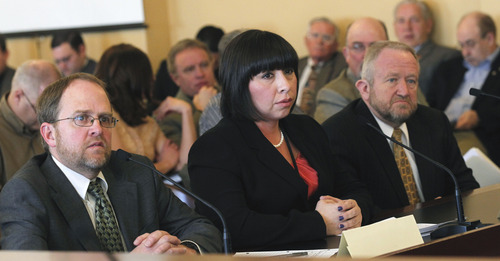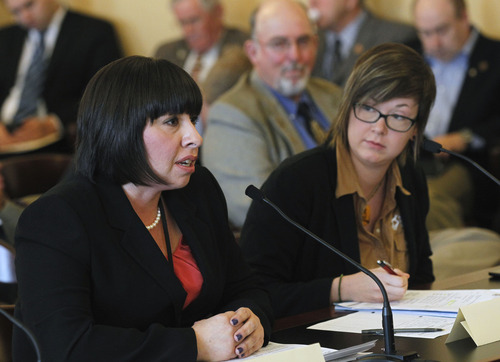This is an archived article that was published on sltrib.com in 2013, and information in the article may be outdated. It is provided only for personal research purposes and may not be reprinted.
A state House committee on Thursday approved a bill that prohibits, with a few exceptions, animal shelters from using carbon monoxide gas in euthanizations.
The exceptions under HB150 are when it would not be safe for the worker to inject an animal or when injection would cause "unacceptable levels of stress" for the animal. The measure also requires shelters to adopt a euthanization policy and training program.
Rep. Angela Romero, D-Salt Lake City, the bill's chief sponsor, told the Natural Resources, Agriculture and Environment committee that her goal would be to have no animals euthanized but "sometimes it happens."
Veterinarian Drew Allen, of the Utah Veterinary Medical Association, said carbon monoxide, if used properly, is an acceptable method to euthanize animals. In cases of a very aggressive animal or feral cats that do not like to be touched, being euthanized by carbon monoxide is "far more humane," he said.
Allen also said that "the advantage to injection is that for the animals that are socialized and are used to handling, they have the human touch as they pass away. I think that we all recognize that that is the ideal situation."
Former Taylorsville Mayor Russ Wall — who has witnessed both types of euthanasia — agreed there are times when gassing is appropriate but said injection is probably the most humane method for the animal. He told the committee that the most controversial issue he dealt with as mayor was having an animal shelter with a carbon monoxide chamber.
A controversy over the use of carbon monoxide to euthanize animals began after a cat named Andrea survived two attempts in fall 2011 by workers at the West Valley-Taylorsville Animal Shelter to gas her. (She later was adopted).
Some opponents of the method said gassing is inhumane because it is frightening for the animal and can take too long to take effect.
At Thursday's committee hearing, Rep. Kay Christofferson, R-Lehi, expressed concern that the legislation would take away too many choices from the workers who euthanize animals.
Mike Morgan, director of the South Utah Valley Animal Shelter in Spanish Fork, said the use of carbon monoxide is humane and that his staff members should be able to pick the method of euthanizing animals that has the least emotional impact on them.
The shelter saved 91 percent of animals it took in last year but had to put down more than 1,900 of them, he said.
"If they have to hold 1,900 animals and feel the life go out of them, I will lose those employees, jobs will be lost, because they won't stay," Morgan said.
The bill passed 10-3 and now moves to the full House for further debate.
Twitter: @PamelaMansonSLC





